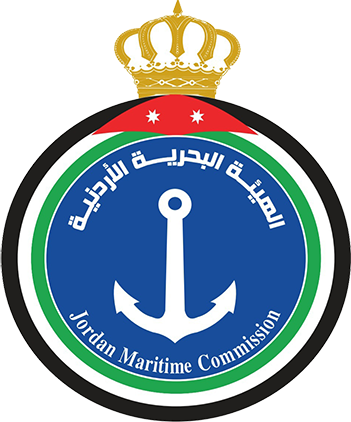About the Jordan Maritime Commission :
The Jordanian Maritime Authority was established by a Royal Decree according to the Jordanian Maritime Authority Law No. (47) of 2002 on 16 August 2002. Hence, the Permanent Law No. (46) 2006 was promulgated.
The Law of the Jordanian Maritime Authority on 10/01/2006, is the largest achievement that has been achieved on The level of the maritime industry in Jordan, where the work of the Jordanian Maritime Authority in organizing, control and developing of the maritime sector in Jordan including legislation, transportation modes, services and human resources taking into account enhancing maritime safety and security, efficiency of navigation and prevention and control pollution from ships to increase the efficiency of the sector and provide best services to customers, and strengthening partnership with national and international stakeholders.
Whereas, like other maritime administrations in the countries of the world, they strive to implement their international obligations arising from them as a result of signing international agreements related to the maritime field, such as:
- Carry out its Flag State duties to register ships under the Jordanian flag, monitor and inspect those ships inside and outside territorial waters, and issue official documents and maritime certificates for workers in the maritime sector;
- Carry out the functions as a Port State by inspecting foreign ships arriving at the port of Aqaba and ensuring their compliance with international standards and requirements;
- Carry out the tasks as a Coastal State are to monitoring the territorial waters and secure the safety of navigation for ships through wireless communication between the control tower and those ships, and to give them permission to enter or travel,
As the considered authority to represent Jordan sovereignty on the only maritime port in Jordan.
Functions of the Jordanian Maritime Commission :
- Organizing, monitoring and developing the maritime transport sector in the Kingdom.
- Enhancing the role of the private sector, encouraging competition and investment, and preventing monopoly in the maritime transport sector in the Kingdom.
- Raise standards of maritime safety and security in order to contribute in protecting the marine environment on national ships (Ships flying Jordanian Flag) and Jordanian territorial waters.
- Granting licenses to the companies that practice and engaged in all activities of the maritime transport sector.
- Registration ships under the Jordanian flag.
- Issuing legal certificates for Jordanian ships.
- Issuing official documents for seafarers and all workers in the maritime transport sector, including documentation of validation of eligibility certificates for marine engineers and marine navigation officers, ID Cards.
- Carrying out maritime inspection work on Jordanian ships and marine equipment inside the port of Aqaba and within the Jordanian territorial waters.
- Monitor tugging, maritime piloting and coastal navigation within the Jordanian territorial waters.
- Follow-up of maritime search and rescue work within and outside Jordanian territorial waters.
- Investigation of maritime accidents and incidents within Jordanian territorial waters and on Jordanian ships, wherever they are.
- Recommending to the Ministry bilateral, regional and international maritime agreements, conventions and following up on their implementation.
- Granting licenses to practice work for companies in all activities of the maritime transport sector.
- Cooperation and coordination with local, regional and international bodies related to the work of the Authority.
- Representing the Kingdom in regional and international maritime bodies, organizations, councils, federations and committees, and following up on their activities.
- Preparing studies, gathering information and data related to the maritime transport sector, classifying and analyzing them, and issuing bulletins and periodic report, circulars on the sector’s activities.
- Exercise the powers of the Aqaba Port Department stipulated in the Maritime Trade Law.
- Take the necessary measures to ensure that ships meet the requirements of maritime security, health security, protection of the marine environment, maritime wireless communications between ships and the authority, confront the effects of maritime accidents and disasters, and detention ships in violation, taking into account the provisions of the Aqaba Special Economic Zone Law.
- Regulating and controlling maritime navigation activities within the territorial waters, taking into consideration the provisions of the Aqaba Special Economic Zone Law.
- Providing, organizing, documenting and controlling the global maritime distress and safety network between ships and shores.
- Issuing permits to leave ships from territorial waters after making sure that there is no technical or judicial detention on them.
- Regulating the entry of ships into the territorial waters, searching for objects falling into the sea, and collecting fees, wages and allowances, according to a system issued for this purpose.
- Any powers entrusted to other official bodies that the Council of Ministers delegates to the Authority.
